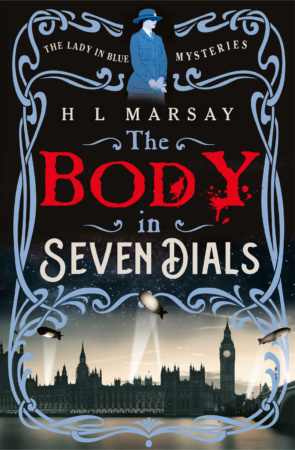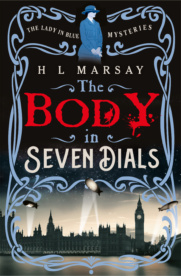Start reading this book:

Share This Excerpt
Chapter One
Standing in the impressive foyer of Marlborough Street Police Court, Dorothy Peto clutched her notebook and pencil tightly to her chest and tried to steady her breathing. Waiting alongside her in their bowler hats and puffing on their cigarettes were the gentlemen of the press. Despite their noisy chatter about the recent assassination in Sarajevo, she was sure they must be able to hear her heart pounding beneath the heavily starched shirt she was wearing. She had ‘borrowed’ the shirt from Raymond, her brother, along with his necktie and tightly belted riding breeches. To complete her disguise, she had piled up and pinned her long dark hair under one of his trilbies and the collar of his huge overcoat was turned up high enough to hide half her face. Although Raymond was sympathetic to their cause, she wasn’t at all sure he would approve of what she was doing. Fortunately, he’d left early that morning for his job in the Foreign Office. The archduke’s murder was keeping him occupied too.
Standing in front of the looking glass in her bedroom over in Bloomsbury, she had felt confident and almost giddy with excitement, laughing at her reflection with Nina and rebuffing her friend’s more outlandish suggestions of adding a moustache or pipe to complete her new look. But now, standing here alone, all her bravery seemed to have deserted her.
It had been Dorothy’s idea to try to enter the court in disguise. All members of the Women’s Freedom League had been banned from the place since staging an obstruction protest there the previous week. Nina and half a dozen others had stood in the lobby with chains looped around their waists and fastened them across the door into the courtroom, preventing any witnesses from entering. Then, when they were arrested and brought before the magistrate, they had given false names, argued with the lawyers and generally delayed the proceedings for several days.
Writing afterwards in their magazine The Vote, Nina had declared the protest to have been a success ‘beyond her wildest dreams’. Unfortunately, it had also meant they were unable to continue their work cataloguing the many cases of injustice women suffered under the legal system.
Dorothy had not taken part in the obstruction protest and with her tall, angular frame, she was the only one of their number who could possibly pass for a man. Eagerly she had volunteered to act as a court reporter. She was desperate to feel like she was making a contribution. It had been almost a year since she had joined the League and although she regularly typed up the court reports for The Vote, she was still a little in awe of the other, older members who all seemed so brave. They thought nothing of giving rousing speeches, chaining themselves to buildings, enduring prison and even going on hunger strikes, all to try to convince the powers that be to give women the vote. Today it was Dorothy’s turn to play her part.
Suddenly, to her left, a heavy oak door swung open and Sergeant Munro, a large Scotsman with an impressive set of ginger whiskers, strode out. Dorothy held her breath. If he looked closely, he was sure to recognise her. Then, to her relief, a distraction arrived. Out of the corner of her eye, Dorothy could see Nina and the others appear at the main entrance and begin to argue loudly with the two policemen on duty there. They soon attracted quite a crowd as they started to sing, and Nina began waving a huge flag bearing the initials of the WFL. Sergeant Munro stood surveying the scene for a moment with his hands on his hips and his large feet planted firmly on the ground. As it became clear the two constables were having little effect subduing the women, he strode over to deal with the disturbance himself.
At the same time the door to Court No.1 opened and the gentlemen of the press began to file in. Dorothy followed them, walking in what she hoped was a manly fashion. Glancing back nervously, she caught Nina’s eye, who gave her a quick reassuring smile. She felt a little better until she heard the journalist next to her mutter, “Bunch of bloody harridans! Give them the vote? They should lock them all up and throw away the key!”
Inside the courtroom, Dorothy carefully kept her eyes lowered and silently prayed she would go unnoticed. Feeling very self-conscious, she slipped into a seat at the back, as far away from everyone else as possible. She breathed in the scent of the place. It was a mixture of leather, tobacco and furniture polish. Up in the gallery, several anxious-looking young women were huddled together, and two older ladies sat on the front row, knitting. Everyone else present was male. The journalists, police officers, clerks, ushers and of course the lawyers. With their black gowns and sharp beady eyes, they reminded Dorothy of the ravens at the Tower.
Presiding over them all was the magistrate, Frederick Mead. At first glance, he had the appearance of a kindly country parson, but Dorothy knew he was nothing of the kind. Of all the magistrates the WFL had catalogued, Mr Mead was by far the worst. Often in his presence, female witnesses and victims were treated more harshly than the males who stood accused. During cases against suffragettes, when he felt the prosecution was not being robust enough, he would sometimes take over the cross-examination himself.
As the clerk of the court announced that proceedings were about to begin, Dorothy quickly opened her notebook and held her pencil at the ready. The first accused, a large man with black hair and a thin mouth, was brought up to the dock. Dorothy began scribbling as the charges against him were read out. Assault where the victim sustained a broken nose, blackened eye and extensive bruising to the torso. The plea was guilty as charged.
“Three months in the second division,” proclaimed Mead briskly. The man in the dock gave a small shrug and waved up at the public gallery as he was led away. A few moments later, his place was taken by a woman of about thirty years old, with a bruised and swollen face. Her head was bare, her hair tangled, and Dorothy could see her lip was still bleeding and dried blood stained the collar of her white blouse. The magistrate glared across at her.
“I see the next is a filthy and disgusting case. All females out of court,” he ordered. Dorothy sank lower into her chair and buried her chin further into Raymond’s coat as Sergeant Munro ushered the other women from the court, as always happened when Mead was handling indecency cases.
Mead waited until all the women had been removed from the gallery and the heavy wooden doors were closed with a thud, before continuing.
“So,” he began, “the victim of the previous case now stands before me as the accused, charged with soliciting. What is the plea?”
“Guilty as charged,” replied the defence lawyer, without bothering to look at his client.
“Nine months’ hard labour,” declared Mead. Dorothy drew a sharp intake of breath. Such a sentence was harsh even for Mead. Her eyes darted to the defence lawyer, but he made no move to appeal.
“What?” screeched the woman in the dock. “That bastard got three months and look what he did to me.” Her swollen eyes flashed with anger as she pointed at her face and a trickle of blood began to weep from the cut to her mouth. Mead’s face was expressionless as he fixed his cold eyes on her.
“Madam, this is your third time before me. If you are unhappy with your sentence, I suggest you find another occupation. Take her away. Next case.”
Two policemen dragged the woman out, her shouts of protest still echoing round the court after she had disappeared from sight. Dorothy wanted to shout out herself. It was so blatantly unfair. That the man should only serve a third of his victim’s sentence, and in second division. That was barely prison at all. He would have frequent visits, be allowed to wear his own clothes and buy in his own food, while that poor woman would spend the months sleeping on a plank bed, with basic rations and picking oakum until her fingers bled.
The shouting woman’s place in the dock was taken by a short, smartly dressed man, named Archibald Abbey. He had a thin moustache and wore steel-rimmed spectacles. The charges were several sexual offences against a minor. He was pleading not guilty. The first witness to be called was the alleged victim in the case. A side door opened and Sergeant Munro guided a young girl into the witness box. She looked terrified and was so small, Munro had to find her a stool to stand on. Following closely behind them was a woman with a pale, pinched face. She was clutching a shawl tightly around her shoulders. Mead watched her approach the witness box and scowled.
“Was I unclear in my instructions, Sergeant Munro?” enquired the magistrate, sarcastically. “I will have no females in court during hearings of indecency cases.”
The policeman’s face flushed red with embarrassment as he turned apologetically to the woman.
“But I’m her mother—she’s only twelve,” she cried as Munro placed a hand on her shoulder. Dorothy winced at the anguish and confusion in her voice.
“Remove this woman,” ordered Mead again.
“What he did to my little girl was more than indecent. He’s a monster! Be brave, sweetheart. I’ll be right outside here waiting for you. Be brave!” the mother called, shaking her head in anger and disbelief as Munro led her out of the court. Dorothy stopped her furious scribbling and looked around the court in horror. Surely someone, a lawyer or a journalist, would speak up. The little girl began to quietly weep.
Mead raised an eyebrow. “Come now, young lady. I see here that you reside with your mother in a public house on the Horseferry Road. I therefore doubt you are quite as innocent, as you would have us all believe.”
A small, satisfied smile crossed the lips of the man standing in the dock as the girl’s sobs grew louder. This was too much for Dorothy. Indignation and frustration bubbled up inside her. To hell with the reporting. She leapt to her feet. Her hat fell to the floor and her hair tumbled down.
“This is wrong!” she shouted. “This girl should have her mother with her. By law, she is allowed her mother.” Every head in the room turned to stare. A sea of shocked and frowning faces.
“Remove that female immediately!” bellowed Mead, his face turning puce. Dorothy continued to protest as Munro and one of the ushers rushed towards her.
“Not again, Miss Peto! Will you women never learn?” he muttered as they took her firmly by each arm. Dorothy tried struggling as they dragged her along, but they were too strong and her feet barely touched the ground. In desperation she attempted to appeal to the rest of the court.
“Gentlemen, please, I beseech you. What’s happening here today is not fair and it is not legal. Will nobody help?” But her pleas were ignored. Not one of the men would even look her in the eye. Did none of them have daughters or granddaughters?
“Shame on you all!” she cried as she was hauled out of the court. The last thing Dorothy saw before the door slammed behind her was the little girl’s pale, frightened face staring back at her.
The two men roughly deposited her outside the main door. Dorothy tried to keep her balance when she was released from their grip, but missed her footing and fell down the two steps leading up to the court, landing in an ungainly heap on the pavement. People hurried past her tutting and shaking their heads until a hand reached out and took hold of hers.
“Well, you lasted longer than I thought,” said Nina with a grin as she hauled Dorothy to her feet. “You’re not hurt, are you?”
“Not really, just a twisted ankle,” replied Dorothy, brushing down her clothes, “but I swear Mead gets worse each day.”
Nina wrinkled up her face in disgust. “That man! It’s a miracle he didn’t have you arrested. Now let’s get you back to the office. You can have a nice cup of tea, then write up what you witnessed.”
Nina took Dorothy’s arm and let her lean against her as she limped along. Constance Antonina Boyle, or Nina as everyone called her, was the leader of the Women’s Freedom League. Her petite frame and delicate features were deceptive. She was a passionate journalist and speaker, and an expert at coming up with ingenious ways to promote their campaign. She was almost twenty years older than Dorothy, but the two women had become firm friends after Dorothy had joined Nina on one of her more daring escapades.
Nina had been banned from attending the House of Commons since chaining herself to the railings outside, so had instead decided to take a boat down the Thames and make her demands while the honourable members were enjoying their tea out on the terrace. When she’d heard Dorothy had been boating on the Isle of Wight, she immediately roped her younger colleague in to steer the motor launch. They had arrived unnoticed, and Nina managed to deliver most of her speech from the roof of the boat. Unfortunately, some politicians had become so irate at the disturbance that they had started pelting them with bread rolls and the two women had only narrowly escaped being captured by a police boat. It had been Dorothy’s first taste of campaigning. She had found it terrifying and exhilarating in equal measure.
“Here she is the heroine of the hour and armed with plenty more ammunition to fire at our so-called justice system,” declared Nina dramatically as the two of them returned to the offices of the Women’s Freedom League on Robert Street. Dorothy felt herself blush. Unlike Nina, she hated being the centre of attention. Before arriving in London, she had been educated at home along with her sisters and still found being part of a large group a little daunting.
“Tell us all about it, Dorothy dear,” said Jean Bagster with a gentle smile. She was one of oldest and kindest members of the League.
“If you don’t mind, I’ll leave that to Nina,” replied Dorothy a little apologetically. “I want to start writing my report straight away, while everything is still fresh in my mind.”
She took a seat behind one of the typewriters and began bashing away at the keys as she listened to Nina begin regaling the others with what Dorothy had told her. Naturally, Nina’s version was even more dramatic, culminating with Dorothy being flung down the courtroom steps rather merely suffering a stumble.
“Well, I only hope those men in court today reflect on the way you were treated and see the error of their ways,” said Lucy Summerton blinking back tears. She was one of the League’s newest recruits. A pretty, young blonde woman, she was very enthusiastic if a little over-emotional at times. Dorothy looked up from her work and shook her head at Lucy’s optimism.
“I doubt seeing me hauled out will make much of an impact on their consciences if they were happy to sit back and watch that poor young girl weeping in the dock. I don’t think I shall ever forget her face.”
Jean came over and patted her on the shoulder.
“Let us hope the little mite remained strong enough to give her evidence and convict that dreadful man.”
“Yes, let’s hope,” agreed Dorothy, but she didn’t feel very confident.
End of Excerpt










